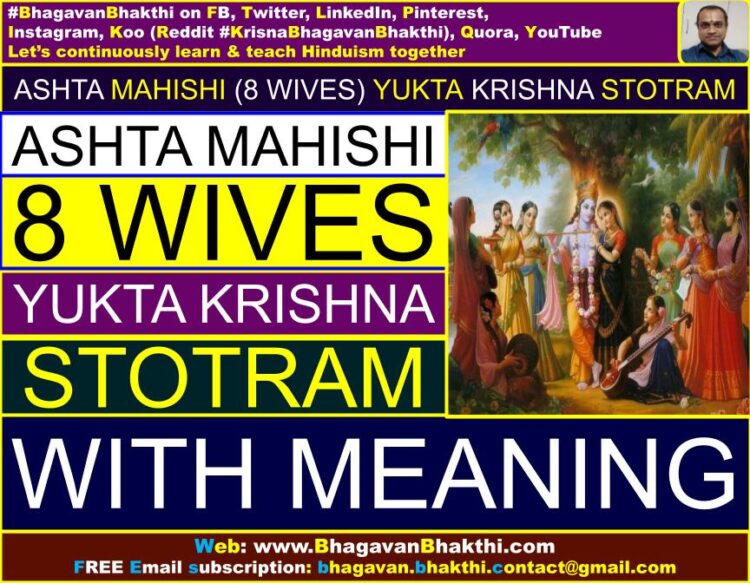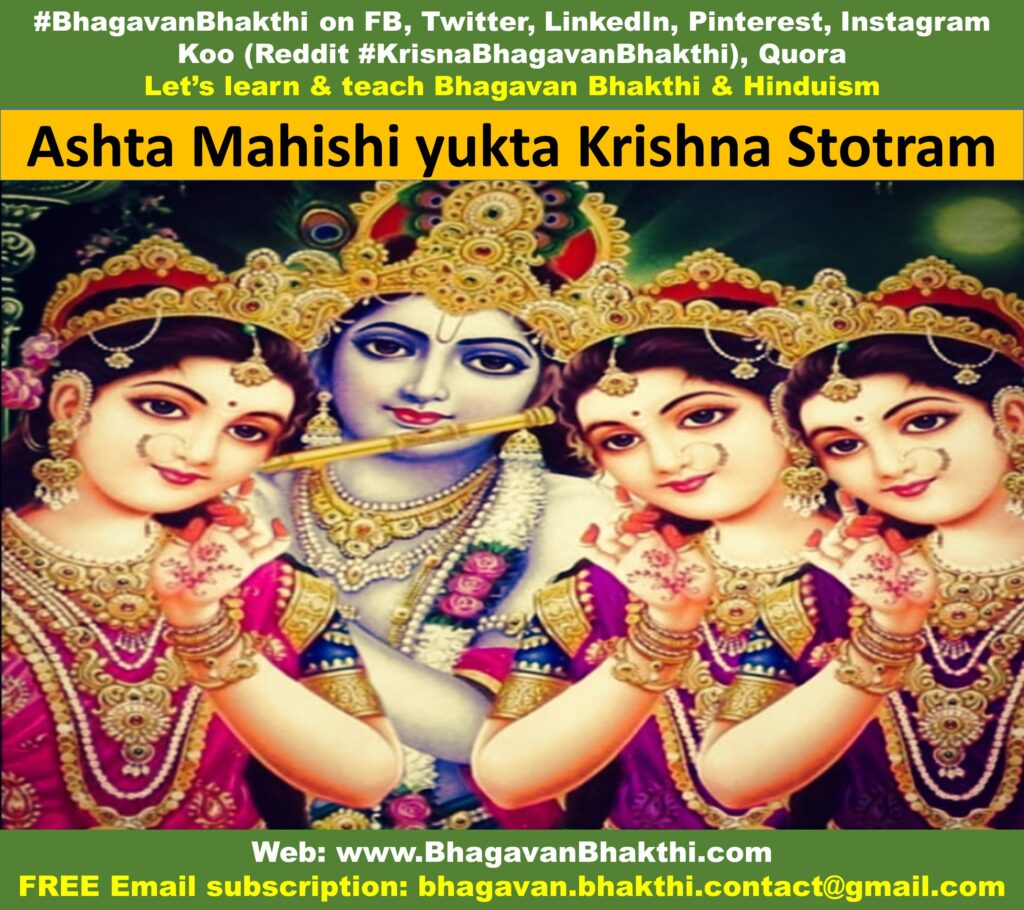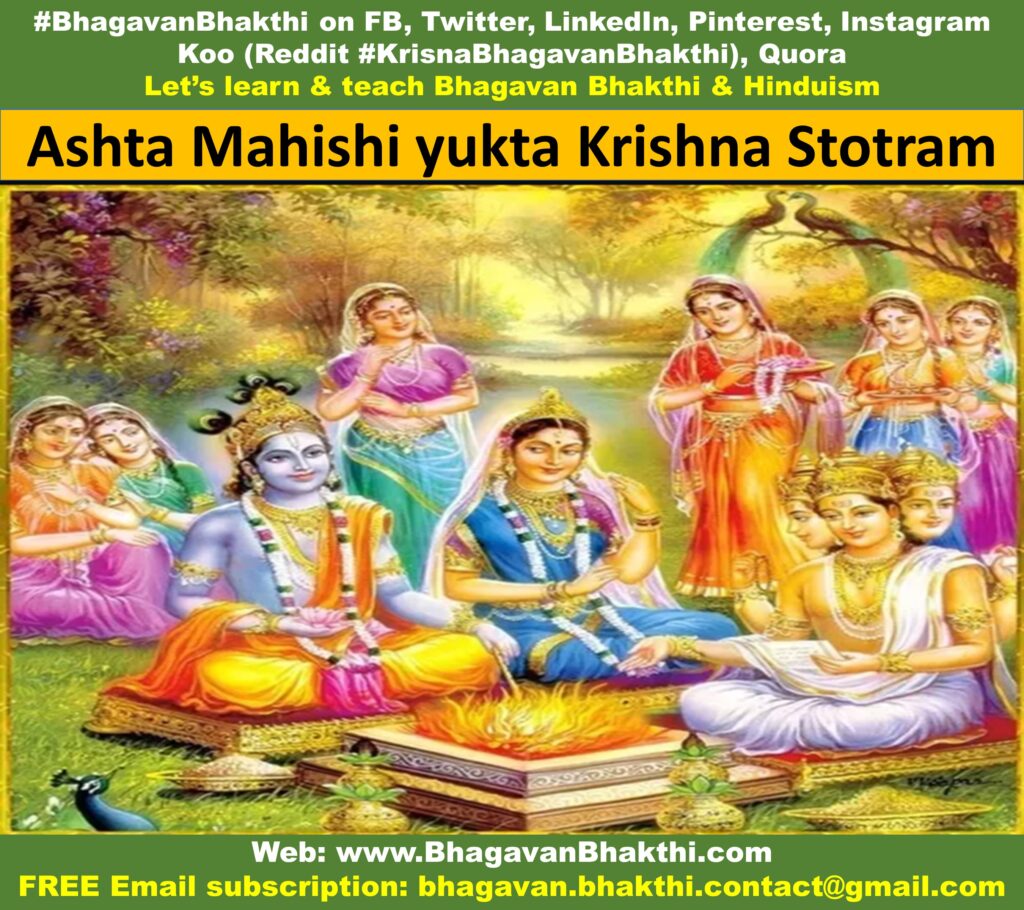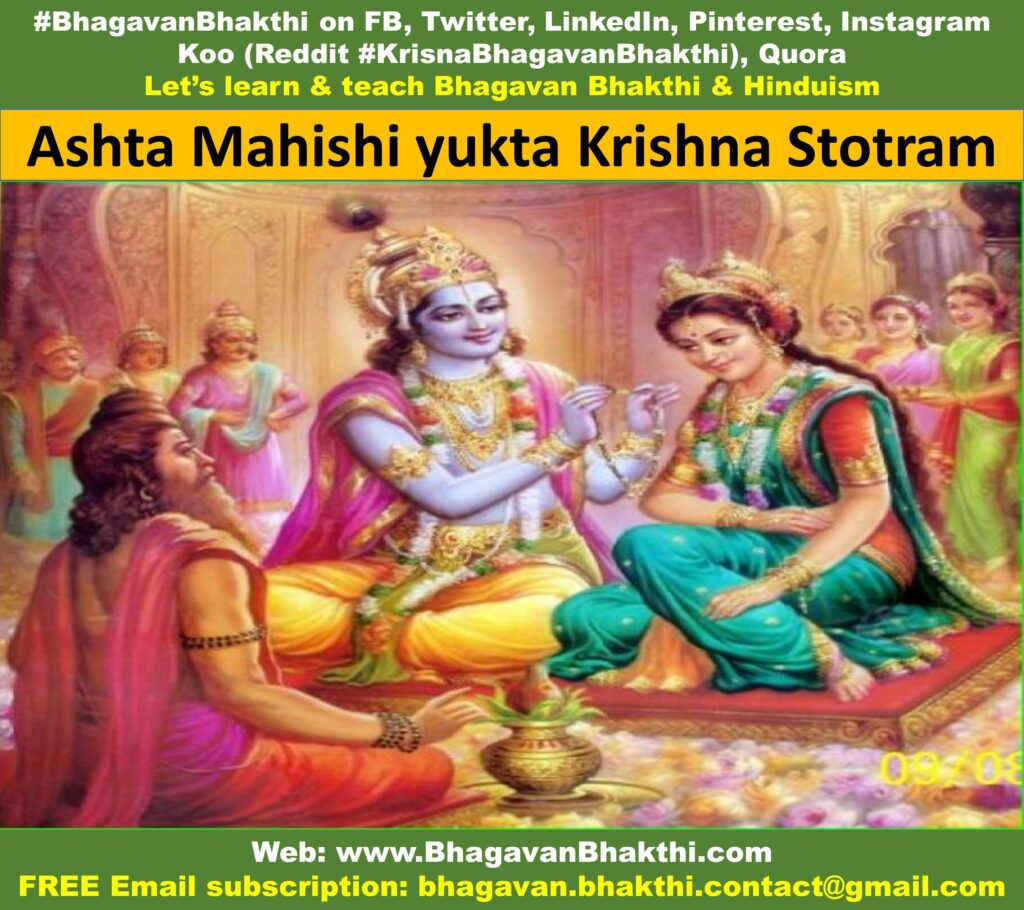Ashta Mahishi (8 wives) yukta Krishna Stotram Lyrics with meaning in Sanskrit (Hindi), Kannada, English
Namaste friends, how are you doing today? Welcome to #BhagavanBhakthi website / blog.
Bhagavan Lord Sri Vishnu (Krishna, Rama, Trivikrama, Narasimha, Vamana, Vasudeva, Mukunda), Goddess Lakshmi (Rukmini, Satyabhama, Sita, Kamala, Maya), Lord Brahma and Goddess Saraswati blessings to you and your family!
In this website / blog, you will always learn about #Hinduism #Sanskrit language.
Also subscribe to my YouTube channel from this link #BhagavanBhakthi to view videos about #Hinduism #Sanskrit language.
Just before going to “Ashta Mahishi (8 Wives) Yukta Krishna Stotram Lyrics with meaning in Sanskrit (Hindi, Kannada, English“, let us know a brief, basic and very important information.

In Dwapara Yuga, Bhagavan Lord Sri Krishna marries totally 16,108 divine Devis. In that first 8 divine Devis are called as ‘ashta mahishis’ (ashta = 8, mashishis = Divine consorts / wives).
1st is Sri Rukmini Devi (She is an avatar of Sri Maha Lakshmi Devi), 2nd is Sri Satyabhama Devi (She is also an avatar of Sri Maha Lakshmi Devi), 3rd is Sri Jambuvati Devi (She is an avatar of Sri Tulasi Devi, 4th is Sri Kalindi Devi.
Whereas, 5th is Sri Mitravinda Devi, 6th is Sri Neela Devi (Also called Sri Nagnajiti Devi, as she is the daughter of King Nagnajita), 7th is Sri Bhadra Devi and 8th is Sri Lakshana Devi (Also called as Sri Lakshmana Devi).
All these names are given in the great epic Mahabharata, Bhagavata Purana etc.
In this post (article) you will find Ashta Mahishi (8 Wives) Yukta Krishna Stotram Lyrics in three different languages, that is, Sanskrit (Hindi), Kannada, English. First we will know the lyrics, later will also know the meaning of this stotram.

Ashta Mahishi (8 Wives) Yukta Krishna Stotram Lyrics in Sanskrit (Hindi) is as given below:
|| अथ अष्ट महिषि युक्त कृष्ण स्तोत्रं ||
ॐ || हृद्गुहाश्रित पक्षीँद्र वल्गुवक्यैः कृतस्तुते |
तद्गरुत्कंधरारूढ रुक्मिणीश नमोस्तु ते || १ ||
अत्युन्नत्याखिलैः स्तुत्य श्रुत्यंतात्यंतकीर्तित |
सत्ययोहित सत्यात्मन् सत्यभामापते नमः || २ ||
जांबवत्याः कंबुकंठालंबिजृंभिकरांबुज |
शंब्रूत्र्यंबकसंभाव्य संबतात नमोस्तु ते || ३ ||
नीलाय विलसद्भूषाजालायोज्ज्वलमालिने |
लोलालकोद्यत्फालाय कालिंदी पतये नमः || ४ ||
जैत्रचित्रचरित्राय शात्रवानीकमृत्यवे |
मित्रप्रकाशाय नमो मित्रविंदा प्रियाय ते || ५ ||
बालानेत्रोत्सवानंतलीलालावण्यमूर्तये |
नीलकांताय ते भक्तावालायास्तु नमो नमः || ६ ||
भद्राय स्वजनाविद्यानिद्राविद्रावणाय वै |
रुद्राणी भद्रमूलाय भद्राकांताय ते नमः || ७ ||
रक्षिताखीलविश्वाय शिक्षिताखिलरक्षसे |
लक्षणा पतये नित्यं भिक्षु श्लाघ्याय ते नमः || ८ ||
षोडशस्री सहस्रेशं षोडशातीतमच्युतम् |
इडेत वादिराजोक्तप्रौढ स्तोत्रेण संततम् || ९ ||
|| इति श्रीमद् वादिराज यति कृतं अष्ट महिषी युक्त कृष्ण स्तोत्रं सम्पूर्णं ||

Ashta Mahishi (8 Wives) Yukta Krishna Stotram Lyrics in Kannada is as given below:
|| ಅಥ ಅಷ್ಟ ಮಹಿಷಿ ಯುಕ್ತ ಕೃಷ್ಣ ಸ್ತೋತ್ರಂ ||
ಓಂ || ಹೃದ್ಗುಹಾಶ್ರಿತಪಕ್ಷೀಂದ್ರ ವಲ್ಗುವಾಕ್ಯೈಃ ಕೃತಸ್ತುತೇ |
ತದ್ಗರುತ್ಕಂಧರಾರೂಢ ರುಕ್ಮಿಣೀಶ ನಮೋಽಸ್ತು ತೇ || ೧ ||
ಅತ್ಯುನ್ನತ್ಯಾಽಖಿಲೈಃ ಸ್ತುತ್ಯ ಶ್ರುತ್ಯಂತಾತ್ಯಂತಕೀರ್ತಿತ |
ಸತ್ಯಯೋಹಿತ ಸತ್ಯಾತ್ಮನ್ ಸತ್ಯಭಾಮಾಪತೇ ನಮಃ || ೨ ||
ಜಾಂಬವತ್ಯಾಃ ಕಂಬುಕಂಠಾಲಂಬಿಜೃಂಭಿಕರಾಂಬುಜ |
ಶಂಭುತ್ರ್ಯಂಬಕಸಂಭಾವ್ಯ ಸಾಂಬತಾತ ನಮೋಽಸ್ತು ತೇ || ೩ ||
ನೀಲಾಯ ವಿಲಸದ್ಭೂಷಾಜಾಲಾಯೋಜ್ಜ್ವಲಮಾಲಿನೇ |
ಲೋಲಾಲಕೋದ್ಯತ್ಫಾಲಾಯ ಕಾಲಿಂದೀ ಪತಯೇ ನಮಃ || ೪ ||
ಜೈತ್ರಚಿತ್ರಚರಿತ್ರಾಯ ಶಾತ್ರವಾನೀಕಮೃತ್ಯವೇ |
ಮಿತ್ರಪ್ರಕಾಶಾಯ ನಮೋ ಮಿತ್ರವಿಂದಾ ಪ್ರಿಯಾಯ ತೇ || ೫ ||
ಬಾಲಾನೇತ್ರೋತ್ಸವಾನಂತಲೀಲಾಲಾವಣ್ಯಮೂರ್ತಯೇ |
ನೀಲಾಕಾಂತಾಯ ತೇ ಭಕ್ತಾವಾಲಾಯಾಽಸ್ತು ನಮೋ ನಮಃ || ೬ ||
ಭದ್ರಾಯ ಸ್ವಜನಾವಿದ್ಯಾನಿದ್ರಾವಿದ್ರಾವಣಾಯ ವೈ |
ರುದ್ರಾಣೀಭದ್ರಮೂಲಾಯ ಭದ್ರಾಕಾಂತಾಯ ತೇ ನಮಃ || ೭ ||
ರಕ್ಷಿತಾಖಿಲವಿಶ್ವಾಯ ಶಿಕ್ಷಿತಾಖಿಲರಕ್ಷಸೇ |
ಲಕ್ಷಣಾಪತಯೇ ನಿತ್ಯಂ ಭಿಕ್ಷುಶ್ಲಾಘ್ಯಾಯ ತೇ ನಮಃ || ೮ ||
ಷೋಡಶಸ್ತ್ರೀಸಹಸ್ರೇಶಂ ಷೋಡಶಾತೀತಮಚ್ಯುತಮ್ |
ಈಡೇತ ವಾದಿರಾಜೋಕ್ತಪ್ರೌಢಸ್ತೋತ್ರೇಣ ಸಂತತಮ್ || ೯ ||
|| ಇತಿ ಶ್ರೀಮದ್ ವಾದಿರಾಜ ಯತಿ ಕೃತಂ ಅಷ್ಟ ಮಹಿಷೀ ಯುಕ್ತ ಕೃಷ್ಣ ಸ್ತೋತ್ರಂ ಸಂಪೂರ್ಣಣಂ ||

Ashta Mahishi (8 Wives) Yukta Krishna Stotram Lyrics in English is as given below:
|| atha aṣṭa mahiṣi yukta kr̥ṣṇa stōtraṁ ||
ōṁ || hr̥dguhāśritapakṣīndra valguvākyaiḥ kr̥tastutē |
tadgarutkandharārūḍha rukmiṇīśa namō̕stu tē || 1 ||
atyunnatyā̕khilaiḥ stutya śrutyantātyantakīrtita |
satyayōhita satyātman satyabhāmāpatē namaḥ || 2 ||
jāmbavatyāḥ kambukaṇṭhālambijr̥mbhikarāmbuja |
śambhutryambakasambhāvya sāmbatāta namō̕stu tē || 3 ||
nīlāya vilasadbhūṣājālāyōjjvalamālinē |
lōlālakōdyatphālāya kālindī patayē namaḥ || 4 ||
jaitracitracaritrāya śātravānīkamr̥tyavē |
mitraprakāśāya namō mitravindā priyāya tē || 5 ||
bālānētrōtsavānantalīlālāvaṇyamūrtayē |
nīlākāntāya tē bhaktāvālāyā̕stu namō namaḥ || 6 ||
bhadrāya svajanāvidyānidrāvidrāvaṇāya vai |
rudrāṇībhadramūlāya bhadrākāntāya tē namaḥ || 7 ||
rakṣitākhilaviśvāya śikṣitākhilarakṣasē |
lakṣaṇāpatayē nityaṁ bhikṣuślāghyāya tē namaḥ || 8 ||
ṣōḍaśastrīsahasrēśaṁ ṣōḍaśātītamacyutam |
īḍēta vādirājōkta prauḍha stōtrēṇa santatam || 9 ||
|| iti śrīmad vādirāja yati kr̥taṁ aṣṭa mahiṣī yukta kr̥ṣṇa stōtraṁ sampūrṇam ||
Meaning of the above “Ashta Mahishi (8 wives) Yukta Krishna Stotram” is as given below:
Sloka 1 : hr̥dguhāśritapakṣīndra valguvākyaiḥ kr̥tastutē |
tadgarutkandharārūḍha rukmiṇīśa namō̕stu tē || 1 ||
Pakshi who is present in our hrudaya / heart (hr̥dguhāśritapakṣīndra) – This means, as said in Upanishad, there are two Pakshis (Divine birds), that is, one is ‘jeevatma’ and another is ‘paramatma’. Someone who is present in jeevas (Living beings).
Sri Vayu Deva is present in our heart as Indra (Not the Indra Deva), because he is the ‘jeevottama’ (Best among all the living beings). Sri Vayu Deva (or Sri Mukhya Prana Deva) is equal to Sri Brahma Deva.
(Here Sri Vayu Deva, that is, Hanuman, Bhima and Sri Madhwacharya Ji are the avatars of Sri Vayu Deva and thus all are one and the same. Also the next Sri Brahma Deva in the next Maha Kalpa is Sri Vayu Deva.)
In the above shloka valguvākyaiḥ means, very the one who uses the most dearest words (valgu = dearest, vākyaiḥ = Someone who uses those dearest words).
kr̥tastutē means, Bhagavan Sri Vishnu is someone who always been served by the divine stotras (Especially by Sri Vayu Deva).
Our Sri Vayu Deva always does the stotra of Bhagavan Sri Vishnu.
Here tadgarutkandharārūḍha – Here Bhagavan Sri Krishna who always raids on the Garuda Raja, that is, he is the Isha / Lord and consort of Sri Rukmini Devi (rukmiṇīśa). I bow down to you (namō̕stu tē).
Sloka 2 : atyunnatyā̕khilaiḥ stutya śrutyantātyantakīrtita |
satyayōhita satyātman satyabhāmāpatē namaḥ || 2 ||
atyunnatyā̕khilaiḥ stutya – Even the best among the best (atyunnatya) always serve you / praise you (Bhagavan Sri Vishnu).
śrutyantātyantakīrtita – Here śrutyanta means the divine Vedas, Upanishads etc. You (Bhagavan Sri Vishnu / Krishna) are so great that even the divine Vedas, Upanishads etc. always praise.
Here satyayōhita means, satya means Vedas and You (Bhagavan Sri Krishna) are always served, worshipped praised etc. by the Vedas and also you are 100% worthy of it.
satyātman – Here satya means who is free from all the activities and atman means the Supreme Lord.
satyabhāmāpatē – You (Bhagavan Sri Krishna) are the consort of Sri Satyabhama Devi. I do namaste to you.
Sloka 3 : jāmbavatyāḥ kambukaṇṭhālambijr̥mbhikarāmbuja |
śambhutryambakasambhāvya sāmbatāta namō̕stu tē || 3 ||
jāmbavatyāḥ – Sri Jambuvati Devi’s. kambukaṇṭhā – Here kambu means round shaped, kaṇṭhā means throat.
lambijr̥mbhikarāmbuja – lambi means someone who has very long divine hands and who has done the alinganam (hugging) using those long divine hands (Of Bhagavan Sri Krishna) on the Sri Jambavati Devi, which is similar to a maala (garland).
śambhutryambakasambhāvya – This means someone who is been always praised (sambhāvya) by Sri Brahma Deva, Sri Rudra Deva, Sri Indra Deva etc.
sāmbatāta – You are the father of sāmba (Bhagavan Sri Krishna and Jambavati Devi’s son Samba). I do namaste to You (namō̕stu tē). Her You means Bhagavan Sri Krishna.
Sloka 4: nīlāya vilasadbhūṣājālāyōjjvalamālinē |
lōlālakōdyatphālāya kālindī patayē namaḥ || 4 ||
nīlāya – Someone who is cloudy blue in color (Bhagavan Sri Krishna), vilasadbhūṣājālāyōjjvalamālinē – You (Bhagavan Sri Krishna) are so divine that you always wear the highly shiny maala (garland), which is always very very auspiciously bright.
lōlālakōdyatphālāya – Your (Bhagavan Sri Krishna’s) forehead hairs are divine beautiful and they are in like the curly hairs.
kālindī patayē namaḥ – You (Bhagavan Sri Krishna) you are the consort of Sri Kalindi Devi. I do namaste to You.
Sloka 5: jaitracitracaritrāya śātravānīkamr̥tyavē |
mitraprakāśāya namō mitravindā priyāya tē || 5 ||
jaitracitracaritrāya – Here jaitra means, You (Bhagavan Sri Krishna) are always victorious wherever you go. You are so great that you always win wherever you go and you are the one who is having highly divine multiform (citracaritra).
śātravānīkamr̥tyavē – You (Bhagavan Sri Krishna) are the one who has always destroyed your enemies who always follow adharma (Against Dharma).
mitraprakāśāya – You (Bhagavan Sri Krishna) always provide the brightness to you devotees. Here brightness means, Bhagavan Sri Krishna has shows the path towards victory which will always be in the Dharma way.
namō mitravindā priyāya tē – I always do namaste to the consort of Sri Mitravinda Devi (To Bhagavan Sri Krishna), who is very loving to your consort (Sri Mitravinda Devi).
Sloka 6 : bālānētrōtsavānantalīlālāvaṇyamūrtayē |
nīlākāntāya tē bhaktāvālāyā̕stu namō namaḥ || 6 ||
bālānētrōtsavānantalīlālāvaṇyamūrtayē – Here bāla means a girl (Sri Neela Devi), nētrōtsava means, someone who has given divine bliss to the eyes of Sri Neela Devi by fighting the 7 bulls. During the swayamvara of Sri Neela Devi, Bhagavan Sri Krishna shows different types of sporty works (Like jumping, etc.).
nīlākāntāya – You (Bhagavan Sri Krishna) are the most loving person to Sri Neela Devi. bhaktāvālāyā̕stu – You help your devotees just like the seed-plot and do protection to all of them (devotees). namō namaḥ – I do unlimited namaste to you.
Sloka 7: bhadrāya svajanāvidyānidrāvidrāvaṇāya vai |
rudrāṇībhadramūlāya bhadrākāntāya tē namaḥ || 7 ||
bhadrāya – You (Bhagavan Sri Krishna) are the one who give auspiciousness (bhadra) to all your devotees.
svajanāvidyānidrāvidrāvaṇāya vai – You (Bhagavan Sri Krishna) are the one who destroys the avidya (Anything which comes in between the knowledge) of all your people/ devotees (svajana). Here nidra means all the things which is not required or something which causes problems to Bhagavan Sri Krishna’s devotees.
rudrāṇībhadramūlāya – Here rudrāṇībhadra means, You (Bhagavan Sri Krishna) are the main (mūla) Bhagavan who give Rudrani’s (Sri Parvati Devi’s) consort, that is, to Lord Rudra Deva all the auspiciousness.
bhadrākāntāya tē namaḥ – I do namaste to You (Bhagavan Sri Krishna), who is the loving consort of Sri Bhadra Devi.
Sloka 8: rakṣitākhilaviśvāya śikṣitākhilarakṣasē |
lakṣaṇāpatayē nityaṁ bhikṣuślāghyāya tē namaḥ || 8 ||
rakṣitākhilaviśvāya – You (Bhagavan Sri Krishna) are the one who protects (rakṣita) all the unlimited Universes (akhilaviśvāya).
śikṣitākhilarakṣasē – You (Bhagavan Sri Krishna) you are the one who give punishment (śikṣita) to all the demons (rakṣasē).
lakṣaṇāpatayē nityaṁ bhikṣuślāghyāya – You (Bhagavan Sri Krishna) are the consort of Sri Lakshana Devi and on regularly (nityaṁ), you are been appreciated (ślāghyāya) by all the rishis, saints, devotees etc. (bhikṣu) on daily basis. Also You are the one make all the rishis, saints, devotees to get appreciated by others. tē namaḥ – I do namaste to You (Bhagavan Sri Krishna).
Sloka 9: ṣōḍaśastrīsahasrēśaṁ ṣōḍaśātītamacyutam |
īḍēta vādirājōkta prauḍha stōtrēṇa santatam || 9 ||
ṣōḍaśastrīsahasrēśaṁ – Bhagavan Sri Krishna apart from the first ‘ashta bharyas’ (8 consorts), he also stays with the remaining 16,100 consorts at the same time. This means, Bhagavan Sri Krishna is so divine and great, that he stays with all the 16,108 of his consorts at the same time.
ṣōḍaśātītamacyutam – He doesn’t depend on the ṣōḍaśa (sixteen) body kalas / arts, that is, he is free from all the sixteen arts. And thus he is called as achutam, that is,
he is not at all losing anything as he has married 16,108 consorts and not dependent on the sixteen body kalas / arts. Thus Bhagavan Sri Krishna is known as ‘aprakruta’, that is, he is not at all dependent on anything or anyone.
(But all others are completely dependent on him starting from Sri Maha Lakshmi Devi, Sri Brahma Deva, Sri Saraswati Devi, Sri Rudra Deva, Sri Parvati Devi, Sri Indra Deva, Sri Surya Deva etc.)
īḍēta vādirājōkta prauḍha stōtrēṇa santatam – Thus with this stotram, Sri Vadiraja Guru has instructed all the devotees of Bhagavan Sri Krishna to do this stotram, so that one will definitely get all the material and spiritual benefits.
The more and more one does stotram (Praising Bhagavan Sri Krishna) of this stotram, then that person will get more and more benefits out of this stotram.
Continue reading about different stotrams (stutis) about Lord Sri Vishnu and other Devatas (Demigods) from here : Stotrams (stutis) about Lord Sri Vishnu and other Devatas (Demigods)
More information will be added to this on regular basis, please visit after some time to know more information.
To watch videos on #Hinduism #Sanskrit language, SUBSCRIBE to my YouTube channel from this link: #BhagavanBhakthi YouTube channel
To know “How did Lord Krishna married many women story?”, please visit this link: How did Lord Krishna married Ashta Mahishis story?
To know stotras of Bhagavan Sri Vishnu, Rama, Krishna and other Devatas, please visit this link: Stotras of Bhagavan Sri Vishnu, Rama, Krishna and other Devatas
To know “Goddess Sri Lakshmi Ashtottara Shata namavali (108 names) with meaning in Sanskrit, Kannada and English languages”, visit this link: Goddess Sri Lakshmi Ashtottara Shata namavali (108 names) with meaning in Sanskrit, Kannada and English languages
To know “Goddess Lakshmi Shlokas (stotras) with meaning in Sanskrit, Kannada and English”, visit this link: Goddess Lakshmi Shlokas (stotras) with meaning in Sanskrit, Kannada and English
To know “What are Goddess Lakshmi names in different avatars along with Lord Hari’s names”, visit this link: What are Goddess Lakshmi names in different avatars along with Lord Hari’s names
Dear friends, if you need any clarifications about this post, kindly let me know, I will definitely try to answer all of them.
Also your one LIKE, one COMMENT, One Share, one SUBSCRIPTION is highly important.
This will help to know the quality of this content and also it will be helpful to know if any improvements is required for the content.
If you feel this content is useful to you and has helped you to improve your knowledge, kindly share this with your well-wishers.
Because “SHARING MEANS CARING”.
For receive FREE EMAIL SUBSCRIPTION about #BhagavanBhakthi, you can send an email to bhagavan.bhakthi.contact@gmail.com from your email ID.
NAMASTE!
Sri Gurubhyo Namaha
Sri Venkateshaaya Namaha
Sri Krishnaarpanamastu
Hi
Can you please give meaning as well for the sloka.
Namaste,
It will be given shortly and same will be informed to you through email.
Keep in touch.
Shubhamastu!
Hi Mrinalini,
The meaning has been updated.
This is for your kind information. I have sent you the email too.
Keep in touch!
Shubhamastu!
Namaste.
The meaning is so deep and divine.
Thank you for sharing this wonderful gem of slokas.
Regards
Dhanyavad, Shubhamastu!